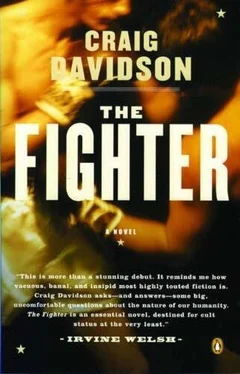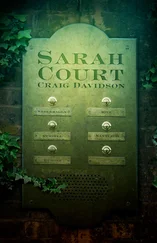Unlike some fighters, Rob was not powered by rage, fear, hatred, a desire to break living things. And while he trained hard and fought regularly, he possessed no true love for the sport. He boxed because his father had boxed and because his uncle still did; because his grandfather boxed and so on down the line back to the Heenan-Morrissey mill and beyond; because for generations the hands of Tully men had stunk of walnut juice. He boxed because the Tullys were fighting stock, and had been for as long as anyone could recall. He’d grown up in the gym among fighters; it had been a foregone conclusion that he’d become one himself.
After a half-hour Reuben parked the truck. He stepped out of the cab and booted the door shut — the Dodge’s door and rocker panel were cratered with dents, the result of many years’ worth of kicks. Rob didn’t like it when his father hoofed the Green Machine; to him it seemed the equivalent of kicking an old trail nag who’d only done its job, albeit fitfully.
Reuben said, “You really screwed the pooch today, I don’t mind telling you.”
“I was concentrating on my footwork.”
“And playing pattycakes with the bag. Trust me on this: no boxer’s ever signed a million-dollar fight deal on account of his footwork.”
Paul Harris sat on bleachers overlooking an empty baseball diamond. Browned grass, sky the color of stone.
His face still bore evidence of the beating. Lingering yellow traceries ringed his eye sockets. No dentist, so still the open gaps in his smile. Paul hadn’t set foot in the winery for a while now; instead he’d spent his days in the field with the pickers.
He’d rise at four o’clock, dress warmly, and slip past his parents’ room out into the pre-dawn darkness. The pickers were up by the time he arrived: sitting around the tractor-hub fire, they kneaded tired muscles and wrapped their fingers in tape. The men cinched buckets to their waists and stepped out into the rows. Paul would thread a bucket’s nylon strap through his belt loop and grab a box cutter, testing its sharpness by running the blade over his thumb.
After finding a quiet row, he’d get to work.
He’d walk in darkness for a minor eternity before the sun rose over the vineyard.
The rows stretched on forever: a span of twisted vines and frozen grapes. His right thigh became one massive bruise from the constant bumping of bucket against leg. The pickers were baffled: Wey you looka da bubu, they’d whisper. Nice wa’am office, fine caa and suits — ees out ’ere workin wid us! Paul was looked out for as though he were an accident-prone child: the pickers shared their lunches and taught him to wrap hot embers in tinfoil, dropping them in his coat pocket to warm his hands.
Late in the first week his father had found him in the fields. “What the hell?” Jack Harris asked his son. “I mean, what… the… hell ?”
Paul tugged a pair of ski goggles down around his neck; a figure eight of pale skin ringed his eyes. Jack Harris was puffing. Gobs of mud clung to his pant legs.
“This is goddamn ridiculous — mucking around in the slop.”
“Thought I’d try something different.”
“What’s so different about it? People have picked grapes for centuries — that is until a few of us wised up and hired someone else to do it for us.”
“It’s honest work. The great outdoors. Fresh air.”
“Fresh air? Have you been reading Iron John or something?” Jack looked ready to grab his son’s arm and drag him back to the office. Harsh and forcible: jerk the ball-joint from his shoulder socket, if need be. But some fresh element in his son’s bearing steered him off this course of action.
“I know what you’re trying to prove, but it’s all a bit silly.”
“Compared to what,” said Paul, “that art show Mom dragged us to?”
“Oh, what are you bringing up that nightmare for?”
“It’s the sort of thing I think about out here. Ridiculous stuff.”
A few months previous they’d attended a conceptual art exhibit at his mother’s request — the artist, Naveed, was the son of his mother’s Pilates instructor. The opening gala was a black-tie affair at a downtown gallery; the exhibit was tided “The Commercialization of Waste.” A huge vaulted chamber displayed various bodily wastes. Milk jugs filled with excrement. Jars of piss on marble colonnades. Egg cartons full of toenail clippings. A salt shaker full of cayenne pepper flakes — in actuality, scabs. Naveed was dressed in flannel jammies, the sort kids wear with the sewn-on booties. He made sure to clarify that every ounce of waste had been produced by his own body. The smell was ungodly. Everyone must have been thinking the same thing: Sperm in Ziploc bags and turds in milk jugs — this is art? Paul and his folks had left without a word.
“What I’m trying to say is,” said Jack, “this environment doesn’t suit you.” He lowered his voice, as though fearful the vines were bugged.
“What if someone sees you — a potential investor?”
Paul razored a grape cluster free and dropped it into his bucket. “No, I’ll stay. This is real life, right? This is good for me.”
“Vitamins are good for you. High colonics are good for you. This is idiotic.”
But Paul felt better than he had in years. Up before dawn, ten hours of backbreaking field labor, collapse into an oblivious, dreamless sleep. The air was so cold and the labor so demanding that its effect was to flatten out his mind. Hours would pass without a single concrete thought: just empty, static wind gusting and swirling through his head, snatches of songs repeating themselves in an endless loop. The seething anger that so often manifested itself in other forms — as cold nausea, as nameless dread — was, if not erased, at least temporarily buried under the weight of physical exhaustion.
Jack grabbed the bucket at his son’s waist and shook it violently. “I was out here when you were a baby,” he said. “It was not good. It was miserable and torturous but it needed to be done so’s I could get that.” He pointed at the winery. “A means to an end.”
“But you turned out all right, didn’t you? Who’s to say those days weren’t the reason?”
Jack picked up a clod of earth and crushed it between his fingers. “Y’know, I said to myself, Let him go. I said, He’ll come around. But you’re out here all day and I may as well be living with a phantom for all I see you around the house. Your mother’s worried sick —”
“Is she really?” Paul hadn’t spoken more than two words to his mother in days; he wasn’t altogether sure how she’d taken to his new endeavor.
“Sure she is,” Jack said. “We’re all worried. And I don’t get it. Some shitkicker beat you up. Big deal. I never told you this, but I took a shit-kicking for a gas-n-dash years ago. This pump jockey whapped me over the head with a squeegee and had me seeing stars. Then he dragged me out behind the lifts and put the boots to me. I was in such bad shape he had to let me go: the cops would’ve booked me on attempted robbery, but I would’ve made damn sure he got booked for assault.”
Paul laughed. “Why didn’t you ever tell me?”
“Why the hell would I? It’s not my habit to go around telling stories that cast me in an unfavorable light.”
Jack looked at his son. In truth, the kid looked pretty good. He’d shed a few pounds and packed muscle onto his legs and shoulders; in all, he looked more like the son he’d imagined. Perhaps getting the stuffing knocked out of him had done him some good. Still, it was as if he’d taken a step down the evolutionary ladder — become stronger, harder even, but less cultured. Even now Jack could smell him: ripe and musky like the first whiff of a logger’s shack. Problem was, his son’s devolution was a threat to their shared futures. What self-respecting woman would marry a man who picked grapes all day and came at her with calloused, purple-stained fingers? How could he pass the business down to a son happy to occupy the lowest rung on the ladder when he’d been earmarked for the highest?
Читать дальше












